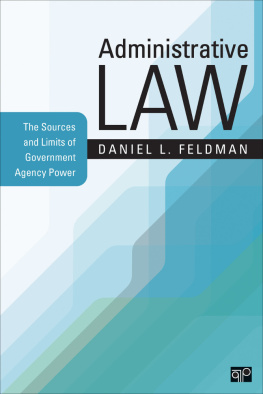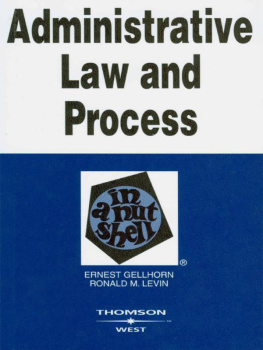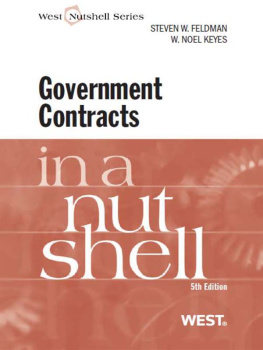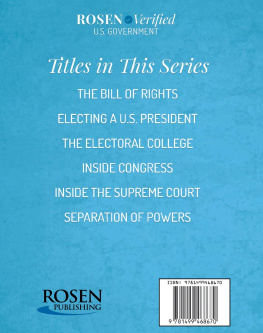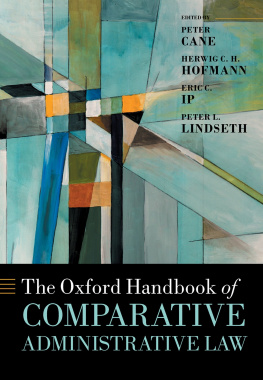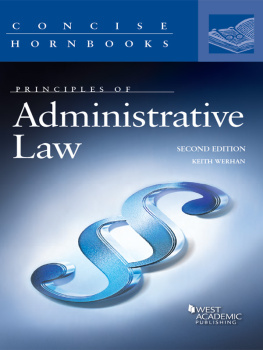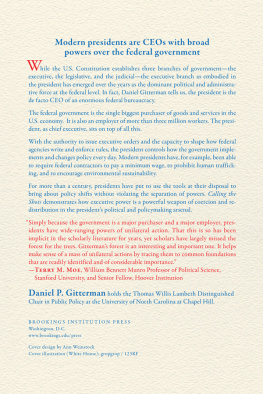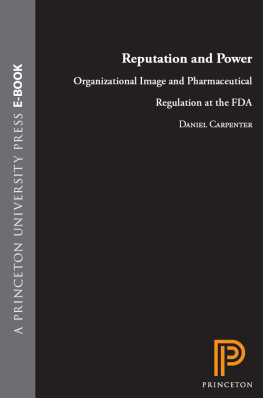FOR INFORMATION:
CQ Press
An Imprint of SAGE Publications, Inc.
2455 Teller Road
Thousand Oaks, California 91320
E-mail: order@sagepub.com
SAGE Publications Ltd
1 Olivers Yard
55 City Road
London EC1Y 1SP
United Kingdom
SAGE Publications India Pvt Ltd
B 1/I 1 Mohan Cooperative Industrial Area
Mathura Road
New Delhi 110 044
SAGE Publications Asia-Pacific Pte Ltd
3 Church Street
#10-04 Samsung Hub
Singapore 049483
Copyright 2016 by CQ Press, an Imprint of SAGE Publications, Inc. CQ Press is a registered trademark of Congressional Quarterly Inc.
All rights reserved. No part of this book may be reproduced or utilized in any form or by any means, electronic or mechanical, including photocopying, recording, or by any information storage and retrieval system, without permission in writing from the publisher.
Printed in the United States of America
Library of Congress Cataloging-in-Publication Data
Feldman, Daniel L., author.
Administrative law: the sources and limits of governmental agency power / Daniel L. Feldman, John Jay College of Criminal Justice, City University of New York.
pages cm
Includes bibliographical references and index.
ISBN 978-1-5063-0854-8(pbk.: alk. paper)
1. Administrative law-United States. I. Title.
KF5402.F45 2016
342.7306-dc232015028148
This book is printed on acid-free paper.
Acquisitions Editor: Sarah Calabi
Editorial Assistant: Katie Lowry
Production Editor: Bennie Clark Allen
Copy Editor: Janet Ford
Typesetter: C&M Digitals (P) Ltd.
Proofreader: Catherine Forrest
Cover Designer: Scott Van Atta
Marketing Manager: Amy Whitaker
Preface
I started teaching administrative law to Master of Public Administration (MPA) students in 1977, taught the course to law students for several years, and now once more teach MPA students. No one, including myself, has ever been satisfied with the available textbooks. Each has very good qualities, but almost all overwhelm the students with much too much material and tedious prose.
I wanted a book that my students would really like; a book that was deep, but short, accessible, and conversational. So I wrote it.
Standard administrative law casebooks include too much material for any student to absorb in a one-semester course, or even in a yearlong course. This text presents information that a student can understand and absorb within a semester. Of course, as the author, it reflects my preferences and priorities as to what to include. Each chapter presents a problem and asks the reader to assume the role of a government official faced with that problem. Administrative law provides guidance, and walks the reader through the kind of logic necessary to apply in that situation, regardless of whether or not the official has a law degree. Each chapter also includes practice problems, generally taken from real-life examples with no answers provided so that instructors have ready-made assignments for their students. The books extensive index and tables of cases and statutes also help instructors and students to locate key points quickly and easily.
Most administrative law texts include in an appendix either the whole of the very lengthy federal Administrative Procedure Act, or much of it, or force the reader to go to some other source to find it. The present book conveniently provides short but relevant excerpts wherever the reader would otherwise need to search for them, and also on necessary occasions provides excerpts from the Model State Administrative Procedure Act, the Code of Federal Regulations, and sample state administrative procedure acts and regulation codes.
Administrative law presents some daunting challenges to its students, but repays the effort needed to master it with a much clearer understanding of the logic of American government. Probably the major difficulty is psychological: people tend to resist rather than assimilate material that generates ambiguity and reflects clashes between equally legitimate values. For example, it may be hard to accept that the interests of taxpayers in the aggregate justify denying relief to a citizen who relied to his or her detriment on bad advice from a government employee; or that some procedural guarantees of fairness to individuals in agency hearings may cost too much in terms of efficiency or even fairness to a larger group of beneficiaries, or to other groups. It is not merely a failure of implementation that stands between us and a system of perfect justice: even in principle, such a system exceeds our reach. People dislike this reality, and try to resist internalizing it.
Another difficulty is intellectual: issues of administrative law transcend particular agencies and particular topics of substantive law, but necessarily arise and the issues are couched in such agencies and their topics. Therefore, students learn about Chevron deference (the concept that judges should not second-guess interpretations of unclear statutes by agencies that administer those statutes) in the context of a case about pollution control; or learn why due process sometimes requires agencies to give joint hearings to pairs of applicants seeking government licenses, in the context of a case about the assignment of radio frequencies to broadcasters. So, students must penetrate some of the substantive law of environmental protection and of communications regulation in order to understand the underlying administrative law principles. These are merely two examples: a thorough review of administrative law draws on examples from virtually every one of the enormous range of substantive law areas administered by agencies.
Perhaps instead of responding to these challenges with enthusiasm, some students of administrative law have just skimmed the surface. If they never really engaged with the deeper issues, issues that challenge the heart as well as the mind, they may have experienced the field as boring. It has long been my goal to show that administrative law, on the contrary, is interesting. I must confess that I have not always succeeded, but at least some of the blame goes to the existing textbooks. A few years ago, a student lingered after the first administrative law class of the semester to ask me a question. As she did so, a student who had taken the course from me in a previous semester happened to pass by. Recognizing the student as a friend, he came into the classroom and proceeded to tell her that I was a very good teacher. While naturally I was grateful for the compliment, the precise way he offered it disappointed me: he said that I had taken very boring material and made it interesting. My goal, of course, had been to persuade students that the material itself is interesting.





